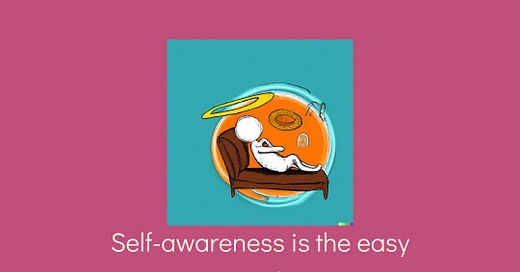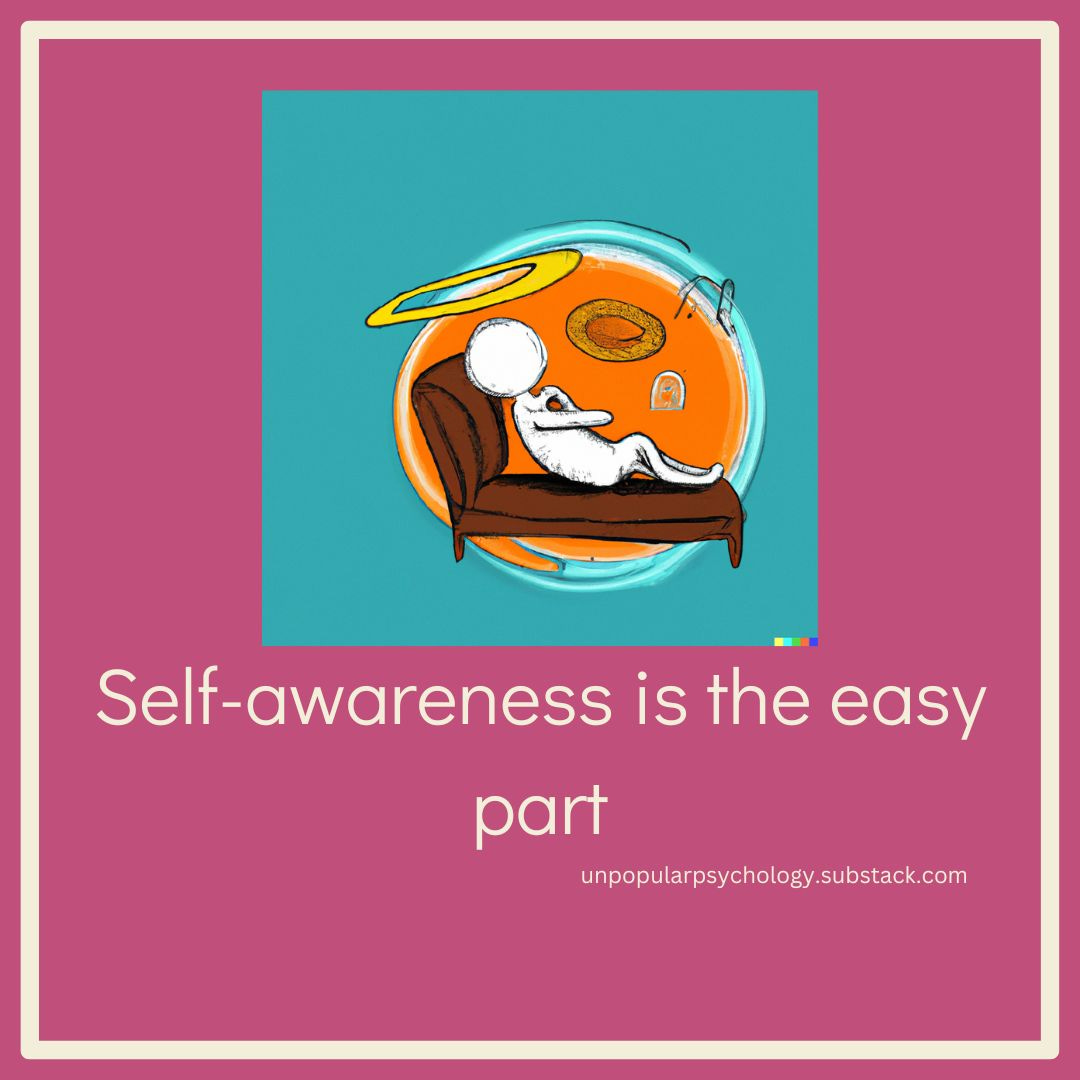Self-awareness is sexy. What was once considered to be an esoteric pursuit by aspiring or seasoned philosophers is today everybody’s topic of curiosity. The many self-help books and Instagram-friendly psychology gurus of this millennium have given us a plethora of awareness adjectives to identify ourselves with - introverted, neurotic, anxious attached, avoidant type, dominant, gaslighted, submissive, manipulative, narcissistic, saviour complex, martyr complex, victim. We find learning about the self a thrilling endeavour and sharing our learnings from it with others, satisfying. Indulging in deep discussions about the self has become a social activity. A few centuries ago, we used to discuss politics and the revolution in coffee parlours, today we discuss the results of our MBTI tests during house parties. We self-diagnose the issues in our relationship - I get too anxious when he doesn’t pick up the phone, I get angry when I see her talking to other guys. We are able to fluently articulate what we think are our predispositions - I have a tendency to shut down when I feel criticised, I completely lose it when I am angry.
Just to be clear, this post is not meant to undermine the role of self-awareness. Awareness of self is perhaps one of the most rewarding investments that we can make in life. Knowing is the first step to almost any positive change. It can be perplexing to not know why we get so angry when our kid makes a mess in the house or why we get so jealous when our girlfriend texts her colleague or how our parents manage to bring out the worst in us. Knowing what is going on inside of us brings a sense of understanding and relief. The problem begins when we forget that it is the first step. Too many of us end up making awareness the last step.
I. Self awareness is not the destination
Awareness is never the end goal. For awareness to become a true a breakthrough, it needs to lead to change. What good are our coding skills if we can’t build something of value with it? What good are our engineering skills if we can’t solve real world problems with it? What good are our mathematical skills if we can’t calculate the right change for our grocer? What good is our self awareness if it doesn’t change the experience of our lives for the better?
Let’s take an example. Imagine a partner in a heterosexual, monogamous marriage who gets anxious every time his spouse talks to another man. He gets extremely nervous at the idea of other men interacting with his wife. He checks his wife’s phone when she is not around, raids her closet for cheating paraphernalia and subjects her to persistent interrogation on the days she comes late after work.
He realises later (because of individual therapy or couples therapy or reading or from conversations with close friends or something else) that infidelity from his past relationships is what is driving his current insecurities. Now this is great for this man to learn. He finally understands why he acts the way he does in his marriage. He’s gotten insight. But learning the roots of his anxieties is only the first step. He now needs to put in the work. This means having to sit with discomfort when his wife talks to her male colleagues. It means having difficult conversations with his wife about his feelings of jealousy and its sources. It means figuring out healthy coping mechanisms to deal with the anxiety and friction that is inevitably going to surface in this whole process.
But I am not sure if that is the route he will take. Him realising the roots of his anxiety might mean that he expects his wife to make space for it. He might demand that she stops talking to her male friends so as to not trigger him. He may want her to be okay with the idea of him checking her phone to alleviate his doubts. He may ask her to message him constantly with updates of her location.
The whole point of awareness is to help facilitate change. But we often forget this. We think that we are static entities who need to be accommodated for and are incapable of accommodating of. We want people to not say or do anything that will disturb how we understand ourselves. If we are introverted, we get upset when we are introduced into a large group setting with no warning. If we are anxious, we get upset when people do things to ignite our anxiety. If we get paranoid easily, we want everybody to take the same safety measures that we do. If we get stressed quickly, we expect others to not behave in stress-inducing ways around us.
II. Knowing is useful insofar it leads to doing
The point of knowing is to do something with that knowledge. The point of digging deep into the pit of our anxieties is to find helpful bits of information there that will help us manage our anxiety better. The point of understanding how introversion works is to know how you can learn to socialise when needed despite being introverted (as opposed to resisting all calls to socialise). The point of acknowledging your argumentative nature is to learn to be more open during disagreements.
There are schools of thought that claim that awareness automatically leads to change. If this were true, the 1000+ blogs that we have read on procrastination would be enough to help us stop procrastinating. The weighing scale would have been enough to help us stop overeating. Our BMI scores would have been enough to send us running to the gym. Research that shows how terrible social media is for our mental health would have been enough to help us get off it. But that hasn’t happened.
We are still bingeing on food and social media. We are still putting off things that we know we need to have gotten to months ago. We are still sleeping at 3am. We are still buying our toddlers ‘smart’ devices. We still continue to smoke. We are still drinking our worries away.
III. How to move from knowing to doing
It’s a tough one. Most people I know struggle with doing something about what they already know. I am naturally one of them too. I continue to struggle with the transition from knowing why I procrastinate to doing things that will actually help stop my procrastination. I also struggle with staying away from social media despite knowing about its many downsides. My clients battle with similar struggles too. But with time, we have both gotten better with this stuff. Here are a few pointers to help you get started on your journey from knowing to doing:
1. Try, try, try: I know this sounds over simplistic but if there is any chance of us succeeding, it lies in the attempts that we make again and again towards our goals. Surprisingly (or not), many of us don’t do this. We quit Youtube for 1 day, can’t take the separation and then go back to the app on Day 2 in resignation. If your fingers have automatically got you back on Youtube after you quit it (this happens, I know), then consciously close the app again. If you find yourself again on the app, close it again. If you reinstalled the app after deleting it for the fourth time, delete it for the fifth time. Keep trying as if you have no other option than to keep trying, because you don’t.
2. Derive motivation from effort: Feel good about trying, never mind the results. Teach yourself to praise yourself for the work itself and not what comes out of the work. When you derive motivation from effort, you are motivated to put in more effort. The more effort you put in, the more chances you have at succeeding. For example, if you have been trying to work through your feelings of low self-esteem, feel motivated by the fact that you are putting in effort to understand your worth rather than waiting to feel good after you understand your worth.
3. Make your everydays matter: Like Annie Dillard once said, “How we spend our days is of course how we spend our lives. What we do with this hour, and that one, is what we are doing.” You have to start working on your goals on an everyday basis. Want to learn a new language? Spend at least 5 minutes learning it everyday rather than spending 5 hours learning it whenever you are in the mood (which will be rarely). Want to stop procrastinating? Start doing the work you are supposed to do now, today. Want to start exercising? Spend at least 2 minutes (just 2 minutes!) exercising everyday for the next 30 days, starting today.
IV. Final words
Yes, we are born with personality traits and genetic predispositions. Yes, we have inherited genes that to a large extent determine how we perform on tests, react to crises and love our partner. Yes, our childhood may have shaped us in undesirable ways. But no matter how strong, these remain tendencies. We are beings capable of astonishing levels of change and we see examples of this all around us - chronic alcoholics becoming addiction researchers, procrastinators becoming productivity coaches, introverts becoming actors, anxious people becoming excellent therapists. This kind of change takes an incredible amount of hard work but is fully possible, and definitely takes more than just ‘being aware’ of your problems.
So the next time you gain an insight about yourself, remember that the insight is meant to be your gateway to change. With great awareness comes the responsibility to do what it takes to emerge from the experience not just more knowledgeable but also a changed human being.





“Awareness is never the end goal. For awareness to become a true a breakthrough, it needs to lead to change. What good are our coding skills if we can’t build something of value with it? What good are our engineering skills if we can’t solve real world problems with it? What good are our mathematical skills if we can’t calculate the right change for our grocer? What good is our self awareness if it doesn’t change the experience of our lives for the better?”
Really good reminder, thank you
This is amazing. I have been listening for a while and often save these. Brilliant writing and advice. Thank you.